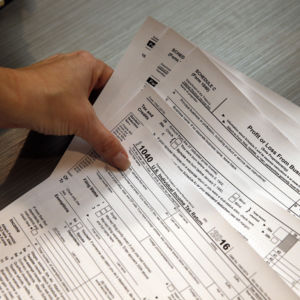According to some recent polling, the public isn’t convinced that tax reform is all that important. This conclusion is based on Gallup and Bloomberg polls, with the latter finding only 4 percent of respondents view taxes as the most important issue that is facing the nation.
The results are disheartening because reforming our outdated tax system after 30 years of inaction should be more strongly supported by the American people, given how much money they send to Uncle Sam each April and the cost and time involved in completing tax returns.
Of course, if you read those polls and come away with the impression that tax reform should clearly remain on the legislative back burner, nothing could be further from the truth. It would more likely be a case of, if the results seem too good to be true, they probably aren’t.
It is not surprising that Bloomberg found that tax reform was not the most important issue facing the country. Health care was at the top of the list for a very good reason. Companies are withdrawing from the ACA individual market at an alarming rate and premiums are projected to be in for a double-digit increase. If you don’t have employer provided insurance, you face the prospect of being uninsured in 2018.
Another reason is what the media cover. Taxes get far less coverage than terrorism, unemployment, immigration or deteriorating relations with Russia.
Gallup results show that over the last decade 40 percent of those polled think their taxes are about right and 50 percent think they are too high. The question is, are these results accurate and robust enough to make tax reform a low priority for Congress and voters? The answer to that is a resounding no. The fact that 45 percent of filers pay no taxes and 40 percent pay 97 percent helps to explain those numbers and is clear evidence of a problem with the tax code that should be a strong call to action to lawmakers to do a better job of educating their constituents about the facts of our outdated tax code. Leadership on reform has never been easy because of vested interests. But, there are compelling reasons tax reform should be a legislative and a voter priority.
While the economy has certainly been looking brighter, growth below 3 percent so far this year shows that it still has a way to go before fully recovering from the recession hangover. And that path would be a lot easier if we had a tax system that encouraged economic growth, entrepreneurship, job creation and left taxpayers with more of their hard-earned income.
The current tax code does the opposite, and with three decades passing since the last tax code rewrite, that’s hardly surprising. Over those 33 years, the tax code has grown from 26,300 pages to 74,608 pages. Growing complexity is a big, big problem for individuals and small businesses.
Tax reform is no easy task, which is likely why it’s taken so long for Congress to take another shot. But the stars should be in alignment this year. There is a broad recognition of the burdens our current tax code imposes on taxpayers and businesses of all sizes. The Trump administration and congressional Republicans are planning a major legislative push when they return after Labor Day. Public support is going to be important for them to get the job done before the end of the year.
So why should voters put taxes and tax reform higher on their priority list?
Interestingly, the Bloomberg poll showed that jobs and unemployment was the public’s second priority right after health care. But with 49 percent stating they don’t believe reducing corporate taxes will create additional jobs, it’s important to explain the connection between corporate tax reform and employment.
Currently, the U.S. corporate rate of 39 percent when state taxes are included, is the highest in the developed world, where the average is 22.5 percent. A lower tax rate would help U.S. companies be more competitive and increase domestic investment.
Growing businesses create more jobs and the effects ripple through the economy. In addition, corporate tax reform would include a provision to repatriate the more than $2 trillion held offshore because of our punitive tax rate. Bringing that money back to the United States translates into more domestic spending and investment.
Congress faces a daunting task not only with its attempt to overhaul the tax code before the end of the year but also in making the case to Americans about why they are doing so. Armed with compelling facts on the benefits to taxpayers, to job creation and to the economy, the next poll results should tell a different story.

